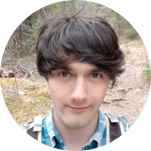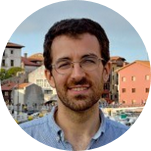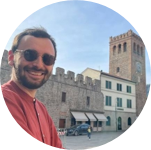Data
You will be redirected to cenamweb.org in 15 second(s). The JINA-CEE website is not updated anymore. The archived website can still be reached through the CeNAM website.
New IReNA Online Seminar Organizing Committee

We are pleased to introduce the members of the 2024-2025 IReNA Online Seminar Organizing Committee!
The committee is comprised of one postdoc representative from each of the IReNA networks, and they are putting together an exciting scientific program for the upcoming academic year:
 Avrajit Bandyopadhyay (University of Florida, USA), CeNAM Representative and Committee Chair
Avrajit Bandyopadhyay (University of Florida, USA), CeNAM Representative and Committee Chair
I am a postdoctoral fellow at the University of Florida, studying the oldest stars in the Milky Way halo and globular clusters. Through spectroscopic analysis, I derive stellar abundances and kinematics to uncover their origins and the astrophysical conditions in the early universe. My research provides constraints on the nucleosynthesis of heavy elements and addresses key questions about the formation of the halo and the chemical evolution of our galaxy.
 Cameron Angus (TRIUMF, Canada), CaNPAN Representative
Cameron Angus (TRIUMF, Canada), CaNPAN Representative
I'm a postdoctoral researcher working at TRIUMF, and my area of interest is experimental nuclear astrophysics. I graduated with a PhD from the University of York earlier this year and my project was on the light element primary process. My undergraduate degree was with the University of Edinburgh.
 Adria Casanovas (UPC - Barcelona, Spain), NuGrid Representative
Adria Casanovas (UPC - Barcelona, Spain), NuGrid Representative
I am a postdoc at the Universitat Politecnica de Catalunya, in Barcelona (Spain). My academic background is in experimental nuclear physics, and my research focuses on the measurement of neutron-induced reactions of interest for the study of the s-process of stellar nucleosynthesis. In parallel, I have gained experience in conducting s-process nucleosynthesis simulations both to study the impact of newly measured reactions, and to identify new high-interest reactions for future measurements.
 Erin Higgins (Queen's University Belfast, Ireland), BRIDGCE Representative
Erin Higgins (Queen's University Belfast, Ireland), BRIDGCE Representative
I am a Leverhulme fellow at Queen's University Belfast, after recently completing a PDRA position at the Armagh Observatory & Planetarium with Jorick Vink. As part of the UK BRIDGCE collaboration, my research focuses on the evolution of massive stars using MESA, together with collaborators Raphael Hirschi and Alison Laird. Most recently, I have published papers on the nucleosynthesis and chemical wind yields of evolved Wolf-Rayet stars, and Very Massive stars (>100Msun).
 Javier Mas Ruiz (Nuclear Sciences Institute - UNAM, Mexico), IANNA Representative
Javier Mas Ruiz (Nuclear Sciences Institute - UNAM, Mexico), IANNA Representative
I am a dedicated researcher in the field of nuclear physics, with a focus on cross-section measurements of nuclear reactions essential for stellar nucleosynthesis. I completed my PhD at the National Autonomous University of Mexico in 2022 and currently hold a postdoctoral position at the Instituto de Ciencias Nucleares, ICN-UNAM.
 Marta Molero (TU Darmstadt, Germany), EMMI Representative
Marta Molero (TU Darmstadt, Germany), EMMI Representative
I am a postdoc researcher at the TU Darmstadt University (Germany), working in the group of Prof. Dr. Almudena Arcones on the origin of r-process elements. My main field is Galactic chemical evolution which I studied under the supervision of Prof. Francesca Matteucci during both my Master's and my PhD at the University of Trieste (Italy). I am mainly interested in the production and distribution of neutron-capture elements from different astrophysical sites and in galaxies of different morphological types.
 Jakub Skowronski (University of Padua, Italy), ChETEC-INFRA Representative
Jakub Skowronski (University of Padua, Italy), ChETEC-INFRA Representative
I am a postdoctoral researcher involved in experimental nuclear astrophysics research. I recently completed my PhD at the University of Padova, where I conducted research at the Laboratory for Underground Nuclear Astrophysics (LUNA) on the proton capture reactions on carbon isotopes. Currently I am involved in several experiments worldwide, contributing to projects that measure reaction cross sections relevant to stellar nucleosynthesis, and I have an expertise in the R-matrix evaluations of nuclear reactions.
